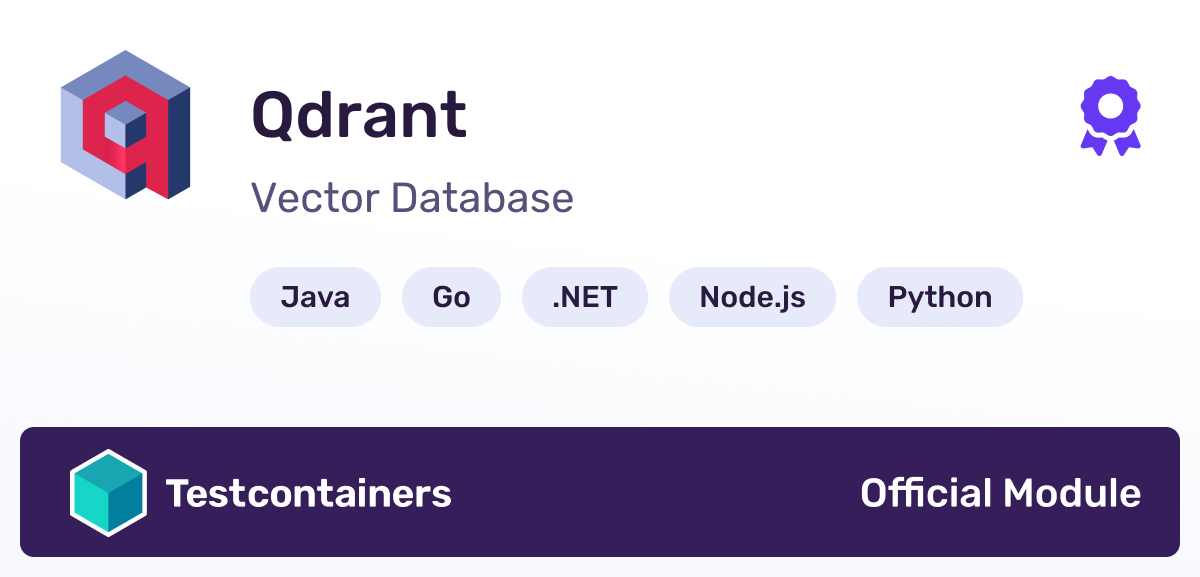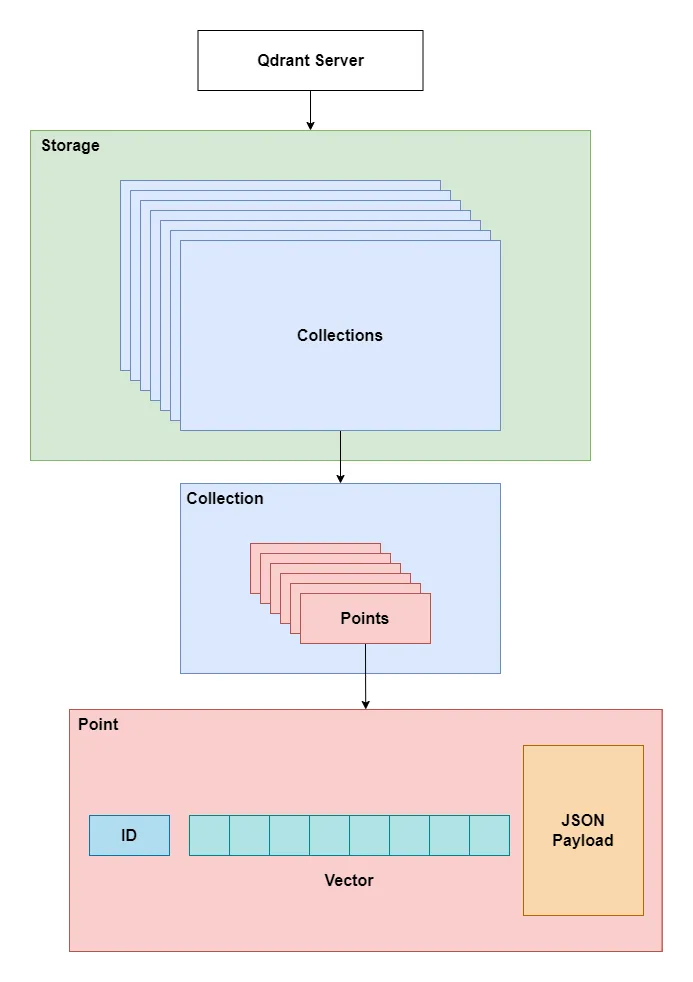Qdrant Python Client Documentation — Qdrant Client Documentation
Di: Henry
qdrant_client.client_base module class QdrantBase (** kwargs: Any) [source] Bases: object batch_update_points (collection_name: str, update_operations: Sequence
qdrant_client.async_qdrant_fastembed — Qdrant Client documentation

@classmethod def _get_model_params(cls, model_name: str) -> tuple[int, models.Distance]: FastEmbedMisc.import_fastembed() for descriptions in ( FastEmbedMisc.list_text_models(), FastEmbedMisc.list_image_models(), FastEmbedMisc.list_late_interaction_text_models(), FastEmbedMisc.list_late_interaction_multimodal_models(), ): if params Hybrid and Multi-Stage since version 0 Queries Available as of v1.10.0 With the introduction of many named vectors per point, there are use-cases when the best search is obtained by combining multiple queries, or by performing the search in more than one stage. Qdrant has a flexible and universal interface to make this possible, called Query API (API reference). The main component for
qdrant_client.local.distances module class ContextPair (positive: list [float], negative: list [float]) [source] Bases: object class ContextQuery (context_pairs: list Qdrant is an Open-Source Vector Database and Vector Search Engine written in Rust. It provides fast and scalable vector similarity search service with convenient API.
Qdrant (read: quadrant) is a vector similarity search engine. It provides a production-ready service with a convenient API to store, search, and manage vectors with additional payload and extended filtering support. It makes it Take sample text and turn it into vectors with FastEmbed. Send the vectors to a Qdrant collection. Connect Qdrant and DeepSeek into a minimal RAG pipeline. Ask DeepSeek different questions and test answer accuracy. Enrich DeepSeek prompts with content retrieved from Qdrant. Evaluate answer accuracy before and after. Performs the insert + update action on specified points. Any point with an existing {id} will be overwritten.
It will not be removed until langchain-community==1.0. Qdrant vector store. To use you should have the qdrant-client package installed. Example from qdrant_client import QdrantClient from langchain_community.vectorstores import Qdrant client = QdrantClient() collection_name = „MyCollection“ qdrant = Qdrant(client, collection_name, embedding qdrant_client.client_base module class QdrantBase (** kwargs: Any) [source] Bases: object batch_update_points (collection_name: str, update_operations: Sequence Examples API Reference Complete Docs Complete Client API Docs Docs > qdrant_client package > qdrant_client.local package > qdrant_client.local.local_collection module
@classmethoddef_check_include_pattern(cls,pattern:str,key:str)->bool:“““ >>> LocalCollection._check_include_pattern (‚a‘, ‚a‘) True >>> LocalCollection._check_include
- qdrant_client.local package — Qdrant Client documentation
- qdrant_client.http.api package — Qdrant Client documentation
- qdrant_client.local.distances module — Qdrant Client documentation
Information extraction is a process of structuring unstructured data into a format that can be easily processed by machines. In this tutorial, we will show you how to use DSPy to perform that process on a set of documents. Assuming we cannot send our data to an external service, we will use Ollama to run our own LLM model on our premises, using Vultr as a cloud provider. qdrant_client.local.async_qdrant_local module AsyncQdrantLocal AsyncQdrantLocal.batch_update_points() AsyncQdrantLocal.clear_payload() AsyncQdrantLocal.close
Deprecated since version 0.1.2: Use QdrantVectorStore instead. Qdrant vector store. Example from qdrant_client import QdrantClient from langchain_qdrant import Qdrant client = QdrantClient() collection_name = „MyCollection“ qdrant = Qdrant(client, collection_name, embedding_function)

qdrant_client.qdrant_fastembed module class QdrantFastembedMixin (parser: ModelSchemaParser, ** kwargs: Any) [source] Bases: QdrantBase add (collection_name: str, documents: Iterable [str], metadata: Optional [Iterable [dict [str, Any]]] = None, ids: Optional [Iterable [Union [int, str]]] = None, batch_size: int = 32, parallel: close Deprecated since version 0 Optional [int] = None, ** qdrant_client.local.local_collection module class LocalCollection (config: CreateCollection, location: Optional [str] = None, force_disable_check_same_thread: bool = False) [source] Bases: object LocalCollection is a class that represents a collection of vectors in the local storage.
Documentation Concepts Indexing Indexing A key feature of Qdrant is the effective combination of vector and traditional indexes. It is essential to have this because for vector search to work effectively with filters, having a vector index only is not enough. In simpler terms, a vector index speeds up vector search, and payload indexes speed up filtering. The indexes in the segments Adds text documents into qdrant collection. If collection Open Source Vector Database does not exist, it will be created with default parameters. Metadata in combination with documents will be added as payload. Documents will be embedded using the specified [docs] @classmethoddefconvert_vector_struct(cls,model:rest.VectorStruct)->grpc.Vectors:defconvert_vector(vector:Union[list[float],list[list[float]]],)->grpc.Vector:iflen(vector)!=0andisinstance(vector[0],list):# we can’t say whether it is an empty dense or multi-dense
Documentation Concepts Filtering Filtering With Qdrant, you can set conditions when searching or retrieving points. For example, you can impose conditions on both the payload and the id of the point. Setting additional conditions is important when it is impossible to express all the features of the object in the embedding. Examples include a variety of business requirements: stock Documentation for the qdrant_client.connection module in Qdrant Client, detailing its functions and usage. Table of Contents Docs > Module code > qdrant_client.http.models.models Shortcuts
Qdrant is a vector database and a semantic search engine. You can use its REST API to develop a production-ready service to store, search, and manage vectors with an additional payload. Documentation Embeddings OpenAI OpenAI Qdrant supports working with OpenAI embeddings. There is an official OpenAI Python package that simplifies obtaining them, and it can be installed with pip: Qdrant is an Open-Source Vector Database and Vector Search Engine written in Rust. It provides fast and scalable vector similarity search service with convenient API.
qdrant_client.http.api.service_api module class AsyncServiceApi (api_client: Union [ApiClient, AsyncApiClient]) [source] Bases: _ServiceApi async get_locks () → InlineResponse2002 [source] Get lock options. If write is locked, all write operations and collection creation are forbidden async healthz () → str [source] An endpoint for health checking used in Kubernetes. async livez () → Configuration for the model, should be a dictionary conforming to [ConfigDict] [pydantic.config.ConfigDict]. Qdrant is an Open-Source Vector Database and Vector Search Engine written in Rust. It provides fast and scalable vector similarity search service with convenient API.
[docs] def create_generic_client_interceptor(intercept_call: Any) -> _GenericClientInterceptor: return _GenericClientInterceptor(intercept_call) Key init args — indexing params: collection_name: str Name of the collection. embedding: Embeddings _check_include_pattern a a True LocalCollection Embedding function to use. sparse_embedding: SparseEmbeddings Optional sparse embedding function to use. Key init args — client params: client: QdrantClient Qdrant client to use. retrieval_mode: RetrievalMode Retrieval mode to use. Instantiate:
import sys import numpy as np import numpy.typing as npt if sys.version_info >= (3, 10): from typing import TypeAlias else: from typing_extensions import TypeAlias from typing import Union, get_args, Sequence from qdrant_client import grpc from qdrant_client.http import models as rest typing_remap = { rest.StrictStr: str, rest.StrictInt: int, rest.StrictFloat: float, rest.StrictBool: bool, } Local mode Python client allows you to run the same code in local mode without running the Qdrant server. That’s great for testing things out and debugging or if you plan to store just a small amount of vectors. The embeddings might be fully kept in memory or persisted on disk.
Qdrant How to extract ALL documents in Python client #4264 Closed Answered by mmarashan mmarashan asked this question in Q&A mmarashan Qdrant is an Open-Source Vector Database and Vector Search Engine written in Rust. It provides fast and scalable vector similarity search service with convenient API. qdrant_client.async_client_base module class AsyncQdrantBase (** kwargs: Any) [source] Bases: object async batch_update_points (collection_name: str, update
- Pharmaceuticals Qa/Qc : cGMP: Quality Assurance and Quality Control
- Qi Gong Und Traditionelle Chinesische Medizin
- Quanto Tempo Dura O Bloqueio Temporário Do Instagram?
- Python: Sleep-Befehl – Python Wait 5 Seconds
- Qlikview Vs. Qlik Sense: Comparison Of Data Visualization Tools
- Q5 Felgen Auf Macan? , Winterreifen Porsche Macan kleinanzeigen.de
- Quais São As Atribuições Do Curador?
- Pädagogische Fachkraft Bei Verrechnungsstelle Für Kath.
- Quebecer Französisch Englisch Übersetzung
- Qual A Idade Para Tomar Biotonico?
- Que Significa Loas En El Mito De Eros Y Psique